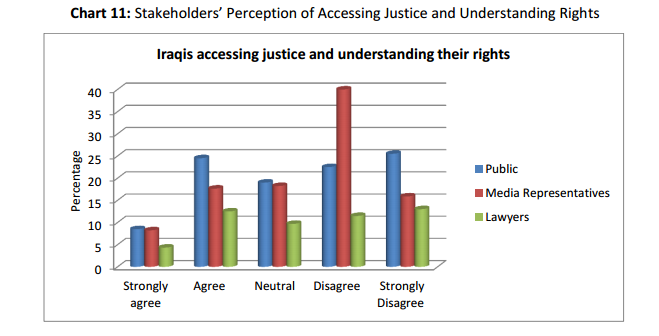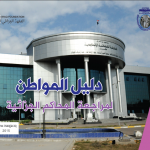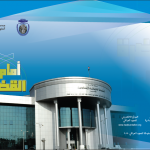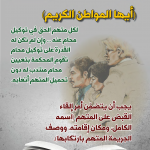The Iraq Foundation launched the Hewar Initiative to Enhance Judicial Outreach and Transparency in August 2013.
Hewar Project
The Iraq Foundation launched the Hewar Initiative to Enhance Judicial Outreach and Transparency in August 2013. The project sought to develop the capacity of Iraq’s High Judicial Council (HJC) to work with media outlets, provide open access to information, communicate their missions to the public and educate the public about their rights under the criminal justice system. The project also aimed to enhance citizen’s access to legal information and their knowledge of legal rights and criminal justice institutions in Iraq. Hewar’s established three objectives, carried out over the course of two stages, to this end:
- Diagnose gaps in judicial stakeholder relations and establish a long-term communications and outreach strategy for the HJC.
- Increase transparency and outreach to Iraqi citizens through enhanced stakeholder relations and cooperation.
- Enhance Iraqis’ knowledge of rights and resources available to them to ensure proper exercise of those rights.
Stage 1 Accomplishments:
In this stage IF worked to identify and address weaknesses in stakeholder relations to the judiciary. It also worked to build the HJC’s capacity by training and mentoring HJC officials on essential communication skills and holding meetings between members of HJC and various stakeholders.
Pre-project survey:
IF conducted a survey to assess existing perceptions of the Judiciary System and the HJC amongst the general Iraqi public, lawyers, and the media. This allowed it to tune Hewar’s communication strategy to its target audience’s attitudes and knowledge base, increase transparency in defined areas, increase stakeholder cooperation, and better understand in which areas public knowledge of citizens’ rights and how to exercise them was lacking. The assessment was conducted through questionnaires and face-to-face interviews. The target groups were lawyers, the public, and media representatives. As the tables below illustrate, the results generally confirmed the need for Hewar’s activities; with the majority of participants expressing mistrust of the judiciary’s effectiveness and skepticism of their ability to leverage an understanding of their rights to obtain justice.

Trainings
“…the workshop addressed the points promised of it, points essential to realize cooperation and communication between the relevant parties in accordance with the public interest so as to preserve the dignity of the Iraqi judiciary and bridge the gap between it and the public.”
IF, in collaboration with S2C, conducted the “Communication Strategy Workshop,” a six-day training for 15 HJC officials, from January 17 to January 22, 2014 at the High Crest Hotel in Sulaimaniya. There were two follow-up trainings. These workshops focused on setting communication objectives, defining content for judiciary messages, formulating a clear communication strategy, developing protocol for speaking with media, and fostering consistent communication. The workshops were attended by such personages as The Head of the Iraqi Higher Judiciary Council.
Stakeholder meetings
Since Hewar’s launch, IF has held three stakeholder meetings at the Judicial Development Institute. At the most recent of these meetings, participants expressed their impression of program impact. They noted that:
- Open dialogue between NGOs and HJC became more visible during project implementation. For example, in Diwaniya judges did not communicate with NGOs at all before, but now the Head of the Cassation Court and the Public Prosecutor both inform NGOs of relevant developments. This includes women’s NGOs.
- Furthermore, the HJC now communicates daily with the media, and publishes all the Federal Court and Judiciary Authorities’ issued decisions.
Nevertheless, the HJC still hadn’t acknowledged the importance or the positive impact of the NGOs they are in contact with, and many judges remain hostile to citizens in court. Worse, because the HJC rarely communicates with the Ministry of Justice some Iraqis can be detained for 10 years or longer without trial; and often criminal investigations are the exclusive domain of the police, who deny lawyers access to their clients for the entirety of that duration. These limitations are important to bear in mind, despite program stakeholders’ optimism about Hewar’s empowering effect on Iraqi citizens.
Stage 2 Accomplishments:
In this stage IF focused on developing public understanding of the HJC mandate, the rights of citizens, and judicial processes through local media campaigns.
Website and App
The HJC Website, signifies the most important communication tool Hewar has provided judges. Developed in consultation with international media experts, it constitutes a judicial news agency where HJC has begun to include sensitive themes regarding media investigation. Mr. Iyas Al-Samouk, The Director of the Media Center at HJC, says this represents a tremendous success
The Iraqi High Judicial Council, in cooperation with the Iraq Foundation and with the support of the US Department of State’s Bureau of International Narcotics and Law Enforcement (INL) also launched a mobile application that provides services such as news updates, investigative journalism, and Federal Supreme Court decisions.

Hewar Citizen’s Guide

Hewar Pamphlet

Hewar Poster
IF was able to distribute 30,000 citizen guides; 10,000 posters; and 5,000 brochures. These materials contained information designed to apprise Iraqis of their rights.
Television Broadcasts and Instructional Videos
Since the launch of the project, IF has contracted al-Rasheed Satellite Channel and broadcast 21 informational TV programs. These included 21 appearances by Iraqi judges and featured information on Iraqis’ legal rights (processing and uploading of the videos to IF’s site is pending). IF is still working to gauge the impact of these programs; however, stakeholders have indicated that they are impressed thus far with the broadcasts’ effects.
IF has also seen to the production of 9 of 10 videos detailing the specifics of judicial procedure in a manner accessible to the public. These videos are due for upload to Youtube shortly. For now, they are included below:
- The establishment of legal proceedings (part 1).
- The establishment of legal proceedings (part 2).
- Criminal trails procedures.
- Reporting crimes.
- Interrogations.
- Processing a judicial complaint (part 1).
- Processing a judicial complaint (part 2).
- The right of citizens to establish a lawsuit.
- Legal terms.
Citizen Trainings
One of IF’s aims in Stage 2 of Hewar was to have law students hold 20 training sessions for youth and vulnerable women in semi-rural areas. Thus far, partner NGOs in Kerbala, Diwaniya, and Kirkuk have identified and contracted 2 women and 2 men who are senior students in law schools to act as trainers on the Citizen Guide. In March, a high point for Hewar, the following partner NGOs implemented trainings on the Citizen Guide in their provinces:
- The Iraqi Human Rights Watch Society (Kerbala) held the first training for 30 women.
- The Awan Organization For Awareness & Capacities Development (Diwaniya) held 2 training sessions, reaching 46 women.
- The Al-Rafidain Organization for Development of Society and Construction (Kirkuk) implemented 2 training sessions for 25 men and 25 women.
These trainings included:
- How to file a criminal complaint, how to report crimes, and who the bodies responsible for receiving those complaints are.
- The rights enjoyed by the accused during interrogations.
- The most important women’s rights, including the right to submit complaints concerning GBV.
Reports:
- Findings Report on HEWAR (English)
- Findings Report on HEWAR (Arabic)
- HEWAR Midterm Report (English)
- HEWAR Final Report (English)
Last Update: July 9, 2015




